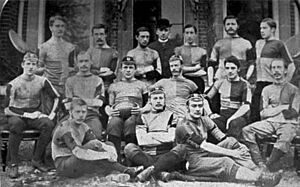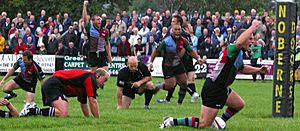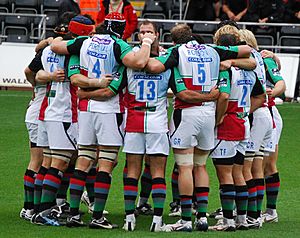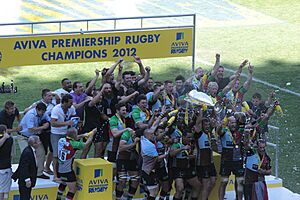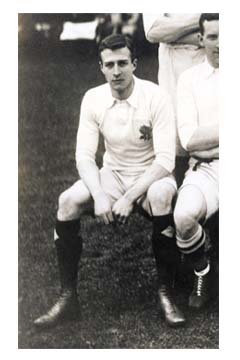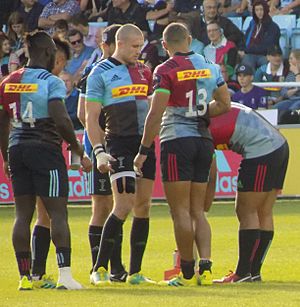Harlequin F.C. facts for kids
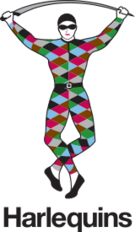 |
|||
| Full name | Harlequins Rugby Football Club | ||
|---|---|---|---|
| Union | Middlesex RFU | ||
| Nickname(s) | Quins, The Entertainers, The Quarters | ||
| Founded | 1866 (as "Hampstead Football Club") |
||
| Location | Twickenham, London, England | ||
| Region | London Borough of Richmond | ||
| Ground(s) | Twickenham Stoop (Capacity: 14,800) | ||
| Chairman | David Morgan | ||
| CEO | Laurie Dalrymple | ||
| Director of Rugby | Billy Millard | ||
| Coach(es) | Danny Wilson | ||
| Captain(s) | Alex Dombrandt | ||
| Most appearances | Danny Care (386) | ||
| Top scorer | Nick Evans (2249) | ||
| Most tries | Dan Lambert (253) | ||
| League(s) | Premiership Rugby | ||
| 2024–25 | 7th | ||
|
|||
| Official website | |||
Harlequins (officially called Harlequin Football Club) is a professional rugby union team. They play in Premiership Rugby, which is the top league for rugby in England. Their home stadium is the Twickenham Stoop, located in Twickenham, London.
The club started in 1866 as "Hampstead Football Club". A year later, some members left to form Wasps RFC. In 1870, Hampstead changed its name to Harlequins. They were one of the first teams to join the Rugby Football Union in 1871.
Harlequins has been a top team for over a hundred years. They continued to be strong when rugby became professional in 1995. The club has won the English championship twice, in 2012 and 2021. They also won the European Challenge Cup three times (2001, 2004, 2011). This is the most wins by any team in that competition. They also won the domestic cup in 1988, 1991, and 2013. Harlequins is the only founding club of the RFU that is still in England's top rugby league.
Harlequins has the most followers on social media among all clubs in Premiership Rugby. They are the second most popular club in Europe, after Stade Toulousain. They are also one of the top 10 most popular rugby clubs in the world.
The current team captain is Alex Dombrandt. Billy Millard is the Director of Rugby for the 2024–25 season.
Contents
Club History
How Harlequins Started
The Hampstead Football Club began in 1866. Their first recorded game was in 1867. In 1867, a disagreement led to some members leaving to form the club now known as Wasps. The club changed its name to Harlequin Rugby Football Club in 1870. They chose the name 'Harlequin' from a dictionary. Everyone liked the new name.
For their first 40 years, the club played at 15 different places. Since 1909, they have only played at three locations. In 1906, the Rugby Football Union invited the club to use the new national stadium in Twickenham. This stadium, Twickenham Stadium, soon became the main home for Harlequin Football Club.
First East Africa Tour in 1961
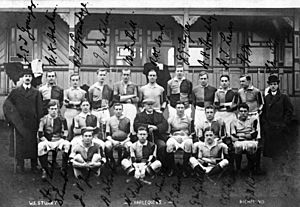
In 1961, Harlequins went on a trip to East Africa. They played with Pretoria Harlequins from South Africa. They were guests of the Kenya Harlequin F.C. and the Rugby Football Union of East Africa. Harlequins won five games and tied one. This trip was special because it was the first time three "Harlequin" clubs played each other. It was also the longest overseas trip by a British club at 19 days.
The London club arrived in Entebbe on May 4. They won their first game 44–13 against Uganda in Kampala on May 6. They also played against Pretoria Harlequins and the host club, Kenya Harlequin F.C. Their last match was against Kenya in Nakuru on May 20, which they won 8–0.
Getting Their Own Stadium
In 1963, Harlequin FC bought a sports ground. It was about 14 acres (57,000 m2) big, right across the road from the Twickenham ground. This became their training field. Later, it became their main home stadium. It was named the Stoop Memorial Ground, after Adrian Dura Stoop. He was a famous player for England and helped develop modern rugby play. In 2005, it was renamed The Twickenham Stoop.
Professional Rugby Era
When leagues started in 1987, Harlequins stayed in the top division. They were one of England's top 12 clubs until 2005. The club won the Rugby Football Union knockout competition twice: the John Player Cup in 1988 and the Pilkington Cup in 1991. They also reached the finals in 1992, 1993, and 2001.
Harlequins holds a world record for having the most players (8) from one club in a Rugby World Cup final. In the 1991 World Cup final, seven Harlequin players played for England. One player, Troy Coker, played for Australia.
Harlequins was the first British team to win the European Shield in 2001. They beat Narbonne 42–33. They were also the first team to win the tournament twice, beating Montferrand 27–26 in 2004.
In 2005, they were moved down to National Division One after finishing last in the top league. In 2006, they partnered with the rugby league club London Broncos. They shared Harlequins' home ground, The Stoop. The Broncos even changed their name to Harlequins RL, but the clubs remained separate.
In the 2005–06 season, Quins were amazing. They won 25 out of 26 league games. They scored almost 40 points per game. They won their return to the Premiership on April 1, 2006.
For the 2008 tour to New Zealand, four Harlequin players were chosen for England. These were Nick Easter, David Strettle, Mike Brown, and Danny Care.
Recent Seasons (2007-2025)
In the 2007–08 season, Harlequins finished 6th in the league. Danny Care and Chris Robshaw were nominated for awards. Coach Dean Richards was also nominated for Director of Rugby of the Season.
For the 2008–09 season, Quins signed new players like Gonzalo Tiesi and Nick Evans. They finished second in the league. They also hosted their first "Big Game" at Twickenham. They tied 26–26 with Leicester Tigers in front of 52,000 fans. In the 2008-09 Heineken Cup, they won their group. They lost to Leinster Rugby in the quarter-finals. This match was where a difficult situation, sometimes called the "Bloodgate Scandal," happened.
The 2009–10 season was tough. The club finished 8th. They also hosted their second "Big Game" at Twickenham. Even though they lost, 76,000 people watched. Conor O'Shea became the Director of Rugby in March 2010.
In the 2010–11 season, Harlequins finished seventh. However, they won the Amlin Cup (19–18) against Stade Français. This was their third Amlin Cup win.
The 2011–12 season was great. Harlequins won their first ten league games. They finished first in the league. On May 26, 2012, Harlequins beat Leicester Tigers 30–23 in the Premiership final. They won their first Aviva Premiership title. Tom Williams and Chris Robshaw scored tries. Nick Evans scored 20 points. Chris Robshaw was named man of the match.
In the 2012–13 season, Harlequins started strong with four wins. They won Big Game 5 against London Irish 26–15. They reached the play-offs but lost to Leicester in the semi-final. They also won the LV= Cup, beating Sale Sharks 32–14 in the final. This was their third English/Anglo-Welsh Cup title.
The 2013–14 season had a slow start due to injuries. They finished fourth in the league but lost to Saracens in the semi-final. In European games, they reached the semi-final of the Amlin Challenge Cup but lost to Northampton Saints.
In the 2014–15 season, Harlequins were inconsistent and finished 8th. They played in the first ever European Rugby Champions Cup. They won some games but were knocked out in the group stage.
The 2015–16 season started well, with Harlequins in 3rd place in January. A highlight was beating Saracens, who had been unbeaten. However, their form then dropped. They finished 7th and missed out on the European Champions Cup. In the European Rugby Challenge Cup, they reached the final but lost to Montpellier.
John Kingston became the new coach for the 2016–17 season. Harlequins finished 6th, qualifying for the European Champions Cup. Kingston left the club in 2018 after 17 years.
Paul Gustard became the new coach in 2018. In the 2018–19 season, Harlequins had a good winning streak. They finished 5th in the league, just missing the play-offs. In the Challenge Cup, they reached the semi-final but lost to Clermont Auvergne.
The 2019–20 season saw many player changes. Harlequins had a strong run of wins at the end of 2019. They reached the Premiership Cup Final but lost to Sale 27–19. They finished 6th in the league, qualifying for the Champions Cup.
The 2020–21 season began with a tough loss. Paul Gustard left the club in January 2021. Harlequins then won 10 of their next 14 games. They reached the play-offs in 4th place. In the semi-final, they made a huge comeback against Bristol Bears, winning 36–43 after extra time. On June 26, 2021, Harlequins beat Exeter Chiefs 38–40 in the Premiership final. They won their second Premiership title! Louis Lynagh scored two late tries, becoming the youngest try scorer in a Premiership final. This game also set records for the most points and tries in a final.
For the 2023–24 season, Harlequins signed new players like Will Joseph and Joe Launchbury. They briefly topped the league in November 2023. In the Champions Cup, they won their first ever knockout game against Glasgow Warriors. They then beat Bordeaux Bègles to reach their first ever semi-final in the competition. They lost to Toulouse in the semi-final.
In October 2024, Harlequins beat Saracens for the first time in four years. Later that month, they won at Exeter Chiefs' home ground for the first time in 10 years. In December 2024, they lost to Gloucester without scoring any points, which was unusual for them. In March 2025, they won an away game against Saracens for the first time since 2012. This meant they beat Saracens twice in one season for the first time since 2008–09.
Stadium
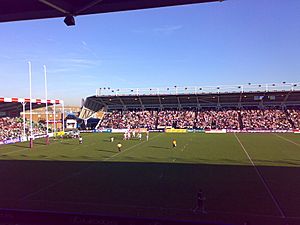
Harlequins play their home games at the Twickenham Stoop in London. The stadium is named after Adrian Stoop. He was a famous England player and a president of the Harlequins club.
The club bought the land, which was an athletics pitch, in 1963. It was about 14 acres (57,000 m2) big and close to the RFU ground. It started as their training field and later became their main home. The stadium has been improved many times. It can now hold 14,800 people. For many years, it was called the Stoop Memorial Ground. In 2005, it was renamed the Twickenham Stoop.
Harlequins also play two special games each year at Twickenham Stadium. One is in December, called the Big Game. The other is in June, called the Big Summer Kick-Off.
Harlequins Foundation
The Harlequins Foundation started in 2015. It is a charity that helps people. It has two main programs:
- Switch: This program helps women and girls become leaders.
- METTLE: This program teaches kids aged 9-12 about physical health and mental well-being. Studies showed that METTLE helped young people feel more confident and make better decisions.
In September 2018, the Harlequins Foundation teamed up with The Movember Foundation. They work together to help rugby fans and the community with men's health issues, especially mental health.
The foundation also runs other programs like Move like a Pro and Project Rugby. They give money to local groups and charities too. In 2020, the Harlequins Foundation became the only Premiership Rugby club allowed to run The Duke of Edinburgh's Award program.
Team Rivalries
Harlequins has rivalries with other rugby teams in the Greater London area.
Many people think Harlequins' biggest rival is Wasps RFC. Both clubs started from the same club, Hampstead Football Club, in 1866. Wasps formed a year later after a disagreement. Even though Wasps moved away from London in 2014, the rivalry is still strong because of their shared history.
Other rivals include Saracens F.C. and London Irish. Both are Premiership clubs located near London.
Since Wasps and London Irish faced financial problems in the 2022–23 season, the rivalry between Harlequins and Saracens has become the most intense in the Premiership.
Team Kit
The Harlequins team kit is very unique. It has stayed mostly the same for many years. The shirt always has four different colored sections. These colors are usually chocolate brown, French grey, magenta, and light blue. The sleeves are black and green. Most changes to the kit have only been about how big the sections are or how the colors are arranged.
The 2021–22 home shirt went back to a more traditional look with green and black sleeves. The 2020–22 away shirt is red and white. It has a design that looks like the London area and the River Thames from above. In July 2022, Harlequins announced a new deal with the British sports brand Castore. Castore now designs and makes the kits for the men's, women's, and youth teams.
Club Honours (Trophies Won)
Major Trophies
- Premiership Rugby
- Champions: (2) 2011–12, 2020–21
- RFU Championship
- Champions: (1) 2005–06
- European Challenge Cup
- Champions: (3) 2000–01, 2003–04, 2010–11
- Runners-up: (1) 2015–16
- RFU Knockout Cup
- Champions: (2) 1987–88, 1990–91
- Runners-up: (3) 1991–92, 1992–93, 2000–2001
- Anglo-Welsh Cup
- Champions: (1) 2012–13
- Premiership Rugby Cup
- Runners-up: (1) 2019–20
- EDF Energy Trophy
- Champions: (1) 2005–06
- Middlesex RFU Senior Cup
- Champions: (1) 1982–83
Other Honours
- Premiership Rugby Shield
- Champions: (2) 2003–04, 2012–13
- Runners-up: (3) 2005–06, 2009–10, 2011–12
- Middlesex Sevens
- Champions: (14) 1926, 1927, 1928, 1929, 1933, 1935, 1967, 1978, 1986, 1987, 1988, 1989, 1990, 2008
- Glengarth Sevens Davenport Plate
- Champions: (1) 1986
- Cunningham Duncombe Series
- Champions: (2) 2015, 2017
- Melrose Sevens
- Champions: (2) 1987, 2017
- Kilmarnock Sevens
- Champions: (2) 1984, 1985
- London City Sevens
- Champions: (1) 2025
Current Team and Staff
Current Squad
The Harlequins team for the 2025–26 season includes: Note: Flags indicate national union as has been defined under WR eligibility rules. Players may hold more than one non-WR nationality.
Note: Players in bold have played for their country's senior team.
Academy Squad
The Harlequins academy squad includes: Note: Flags indicate national union as has been defined under WR eligibility rules. Players may hold more than one non-WR nationality.
|
|
Club Staff
Rugby Department
| Role | Name |
|---|---|
| Director of Rugby |
First Team Coaching
| Role | Name |
|---|---|
| Head Coach | |
| Attack and backs Coach | |
| Scrum and transition coach | |
| Defence Coach | |
| Skills and transition coach |
Academy Staff
| Role | Name |
|---|---|
| Academy Manager | |
| Academy Coach Development Manager | |
| Academy Coach | |
| Academy Coach |
Famous Former Players
Lions Tourists
These Harlequins players were chosen for the Lions tours while playing for the club:
- Alex Palmer (1910)
- Horace Evelyn Ward (1910)
- Jim Reeve (1930)
- Pop Dunkley (1936)
- Robin Prescott (1936)
- Phil Davies (1955)
- J. R. C. Young (1959)
- David Marques (1959)
- Bob Hiller (1968 & 1971)
- Stack Stevens (1971)
- Peter Dixon (1971)
- Will Carling (1989 & 1993)
- Paul Ackford (1989)
- Jason Leonard (1993, 1997 & 2001)
- Brian Moore (1993)
- Peter Winterbottom (1993)
- Keith Wood (1997 & 2001)
- Will Greenwood (2001 & 2005)
- Ugo Monye (2009)
- Joe Marler (2017)
- Kyle Sinckler (2017)
- Marcus Smith (2021 & 2025)
Rugby World Cup Players
These players represented their countries at the Rugby World Cup while playing for Harlequins. Winners are in bold:
- 1987: Jamie Salmon, Marcus Rose (England)
- 1991: Brian Moore, Jason Leonard, Paul Ackford, Michael Skinner, Peter Winterbottom, Will Carling (captain), Simon Halliday (England); Troy Coker (Australia)
- 1995: Brian Moore, Jason Leonard, Will Carling (captain) (England); Jim Staples (Ireland)
- 1999: Jason Leonard (England); Gareth Llewellyn (Wales), Luke Gross (USA)
- 2003: Jason Leonard, Will Greenwood (England); Schalk van der Merwe (Namibia), Norman Ligairi (Fiji)
- 2007: Nick Easter, Andy Gomarsall (England); Tani Fuga, Steven So'oialo (Samoa)
- 2011: Nick Easter (England); Tomás Vallejos (Argentina), Maurie Fa'asavalu (Samoa)
- 2015: Joe Marler, Chris Robshaw (captain), Nick Easter, Danny Care, Mike Brown (England); Netani Talei (Fiji), Jamie Roberts (Wales), Tim Visser (Scotland)
- 2019: Joe Marler, Kyle Sinckler (England); Michele Campagnaro (Italy), Paul Lasike (USA), Tevita Cavubati, Semi Kunatani, Vereniki Goneva (Fiji)
- 2023: Jack Walker, Joe Marler, Danny Care, Marcus Smith (England); Dino Lamb (Italy), André Esterhuizen (South Africa), Dillon Lewis (Wales)
Club Captains
These players have been club captain since rugby became professional in 1995:
- 1994–1995
 - Brian Moore
- Brian Moore - 1995–1997
 - Jason Leonard
- Jason Leonard - 1997–1998
 - Keith Wood
- Keith Wood - 1998–1999
 - Zinzan Brooke
- Zinzan Brooke - 1999–2000
 - Will Carling
- Will Carling - 2000–2001
 - David Wilson
- David Wilson - 2001–2002
 - Garrick Morgan
- Garrick Morgan - 2002–2006
 - André Vos
- André Vos - 2006–2008
 - Paul Volley
- Paul Volley - 2008–2010
 - Will Skinner
- Will Skinner - 2010–2014
 - Chris Robshaw
- Chris Robshaw - 2014–2015
 - Joe Marler
- Joe Marler - 2015–2017
 - Danny Care
- Danny Care - 2017–2018
 - James Horwill
- James Horwill - 2018–2020
 - Chris Robshaw
- Chris Robshaw - 2020–2024
 - Stephan Lewies
- Stephan Lewies - 2024–Present
 - Alex Dombrandt
- Alex Dombrandt
See also
 In Spanish: Harlequins FC para niños
In Spanish: Harlequins FC para niños
- Rugby union in London
- Harlequins Women
 | James B. Knighten |
 | Azellia White |
 | Willa Brown |


